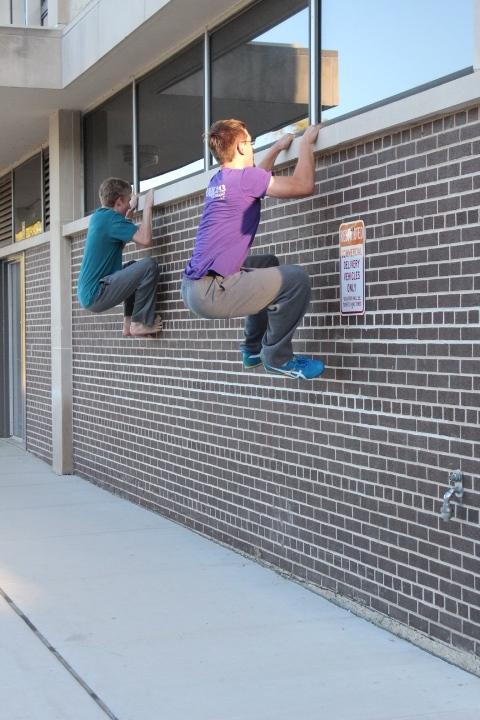By Nat Edson
Parkour is defined as the activity or sport of moving rapidly through an area, typically in an urban environment, negotiating obstacles by running, jumping, and climbing.
To the people involved in it, it can mean a lot more than that.
“It’s a way to express through movement,” Whitewater Parkour Club President Steven Boutcher said. “Kinda treat it like a dance. I let my body flow; whatever my instincts tell me to do, I do it.”
Developed in France during the late 1980s, parkour is an activity that aims to get the practitioner from point A to point B in the most efficient way possible. To do this, they are allowed only the use of their own bodies.
The discipline is tough but not impossible, according to Boutcher. While many get into the activity through replication of YouTube videos and the like, a number of places exist for more formal training. This includes both the Parkour Club at UW-W, as well as the more expansive and organized Wisconsin Parkour. Wisconsin Parkour is a group that offers classes around the state to better Parkour abilities for those winterested.
For Boutcher, the initial spark came from the 2008 video game “Mirror’s Edge,” an action adventure game where the player takes on the role of a messenger who utilizes parkour to move about an urban setting. After playing, Boutcher took to the Internet to find out more and began teaching himself.
“We call the years before finding the parkour community the invinciple.” Boutcher said. “We think we can do it before finding out how hard it is. You have to prep yourself or you can get hurt.”
The Parkour Club and Wisconsin Parkour both advise baby steps for beginners, stressing the importance of knowing your limits. Individuals build foundational skills, and once they have that good foundation you they start to learn more difficult things. This helps to build stamina, endurance and strength
These are the kind of attributes that club member Sonja Trocke said help her progress. Initially attracted through YouTube, Trocke was excited to learn that UW-W had a Parkour Club.
“I thought to myself, why not just go for it?” Tocke said. “And I’m glad I did because I have made so many friends. We feel like a family almost.”
Boutcher and Trocke have dedicated large portions of themselves to parkour without being consumed by it. Boutcher is a Spanish education major, and Trocke an art education major. Both intend to become teachers after graduating but not to give up their discipline.
“Anybody can do it if they bring the will or spirit,” Trocke said. “That’s what parkour is all about. It’s about making something out of nothing.”


